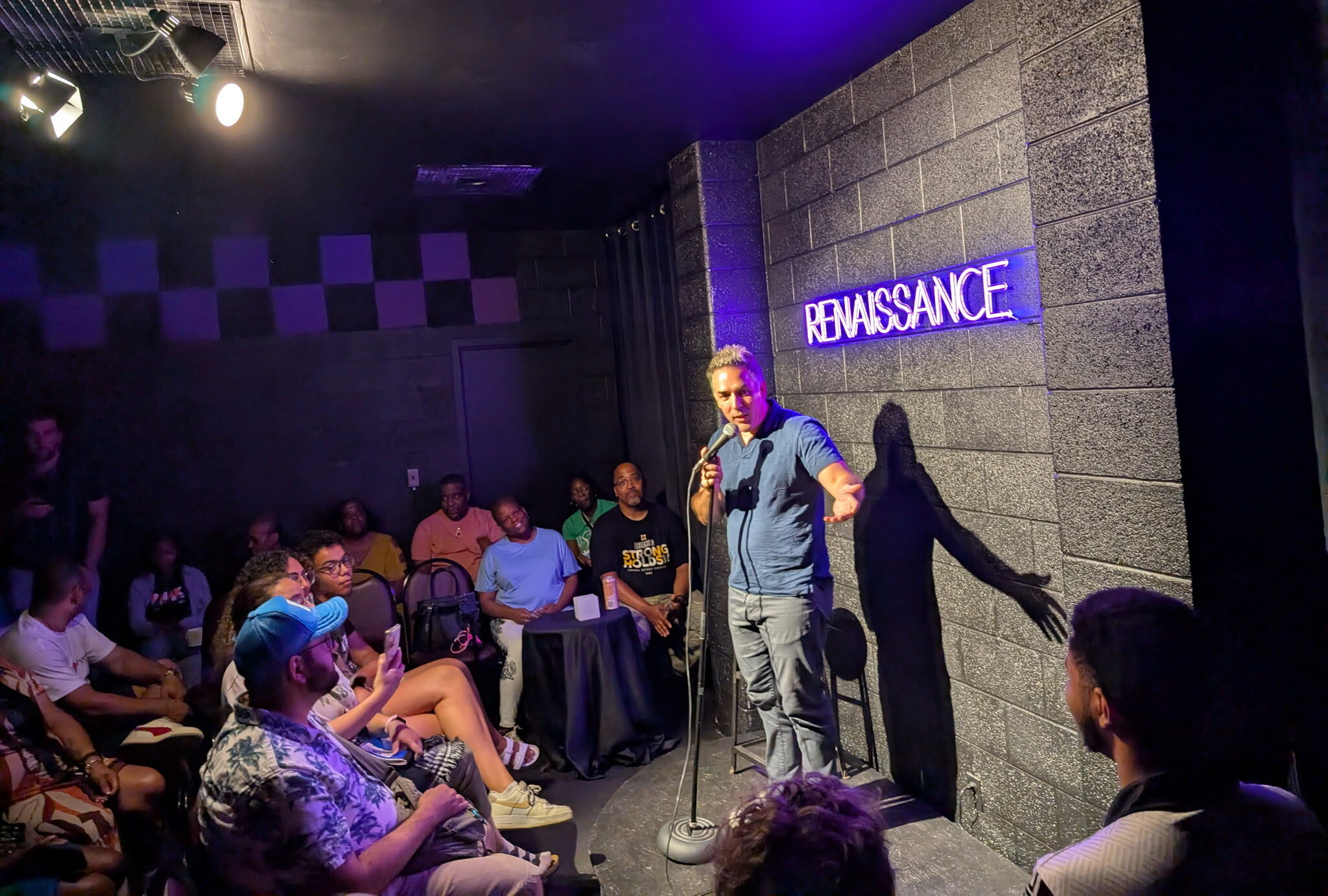Sermons, Sobriety, and Stand-Up
Sermons, Sobriety, and Stand-Up
By Ray Marcano
Renaissance Vineyard Church builds community through the gospel, outreach and—comedy?
Yes. Comedy.
The church holds a monthly “Joke Gym,” a PG-13 rated show in the basement of its facility in Ferndale, MI, a suburb of Detroit.
Co-lead Pastor Drew Fralick used his background as inspiration for his church-comedy club idea, which he called “pretty controversial, really out-of-the-box.” But he’s a big believer in what he calls “in-between spaces” that connect church with community.
Fralick knows something about the funny business. He spent 11 years in China performing as a comedian and opening comedy clubs.
Upon moving back to the U.S., Fralick and his wife, Laurie, joined the church of about 100 congregants. In 2021, the church’s founding pastor announced he was leaving and asked Fralick if he’d like to succeed him.
“I thought, I’ve never been a pastor. I don’t really know anything about that. And he goes, ‘Well, you’re a therapist and a comedian. That’s a pretty good start for any pastor post-pandemic.’”
Now, Fralick and his wife serve as co-pastors.
Fralick combined his Master’s in mental health counseling and passion for comedy into a community experience.
Each Friday night, the church holds Celebrate Recovery, a Christian 12-step program for drugs, alcohol, and trauma.
Fralick decided that laughter could help attendees take their mind off their troubles, if only for a little bit. After the Celebrate Recovery meeting at 6:30 p.m., Fralick opened an alcohol-free bar at 8 p.m., followed by the comedy show at 9 p.m.
The bar became a community draw for people who wanted to have a fun night out without consuming alcohol.
“It exploded,” Fralick said. “The sober community is pretty big in Metro Detroit. We’ve had a lot of those people come through our doors, people who maybe haven’t stepped foot inside of a church in maybe 20-30 years or they wouldn’t be caught dead in a church, they’re coming to this in-between space.”
While his church board supported the idea, he ran into some opposition from parishioners and comedians.
The comedians wondered how they could perform in a church environment and follow the Joke Gym’s clean comedy mandate. “I think that a really good artist can fit within constraints,” Fralick said.
But he quickly learned he had to set boundaries for what was and wasn’t appropriate material.
“In the beginning, we said, ‘Let people use their best judgment,’ which was not a good idea,” he said, laughing. “I learned 85% of (comedians) are very smart. They’ll read the room, and they’ll say, ‘Oh I’m in a church, maybe I shouldn’t do this.’ And 15% of people just don’t care. We’ve hemmed it in a bit, because comedians will just go right to the edge if you let them.”
Off-limit topics include glorifying drug use and violence, and pedophilia and rape.
Some members of the congregation worried about the joke topics and that comedians would poke fun at religion. (Fralick has poked fun himself, like with his routine on a privileged Adam and Eve.)
Fralick pushed on, painting the church basement walls and ceiling black so it had a more comedy club vibe. The basement already had a stage, and he created an area for the bar. With a little paint and elbow grease, he created the club space with little money.
Over time, the opposition waned. Comedians now contact Fralick hoping for a chance to perform. Most of the shows are donation-only with just a few ticketed events for bigger names. Every week, the space, with about 40 seats, sells out.
Church goers mingle with community members, an important part of Fralick’s in-between philosophy.
“We need a place where the religious world and the outside world can interact,” he said.
Now, some two and a half years later, the Joke Gym has become a community staple, and Fralick is proud of the church’s uniqueness.
“This church values authenticity,” he said. “It’s not a stuffy religious environment. So having a comedy space helps us not take ourselves too seriously, to poke fun at stuff, and have a good time. This church does a lot in the community, so being able to host events aligns with that.”
This story is part of Lake Institute’s story collection, the Faithful Generosity Story Shelf, which highlights congregations and other religious organizations who have sought to use their assets and resources in creative—and sometimes surprising—ways as an expression of faithful giving.
Each entry in our Story Shelf is short enough to be read and discussed during a committee meeting or other group gathering. Our hope is that these accessible vignettes will spark new questions, conversation, and imagination among clergy and laity about what might be possible with the funds, buildings, land, and other resources in their care. If you know a story that should be included in the Story Shelf, suggest it here.
Subscribe
Insights is a bi-weekly e-newsletter for the religious community and fundraisers of faith-based organizations that provides:
- Reflections on important developments in the field of faith and giving
- Recommended books, studies and articles
- Upcoming Lake Institute events

